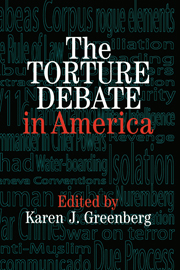Book contents
- Frontmatter
- Contents
- Acknowledgments
- List of Contributors
- Introduction: The Rule of Law Finds Its Golem: Judicial Torture Then and Now
- THE ISSUES
- ESSAYS
- Section One: Democracy, Terror and Torture
- 1 Liberalism, Torture, and the Ticking Bomb
- 2 How to Interrogate Terrorists
- 3 Torture: Thinking about the Unthinkable
- 4 The Curious Debate
- 5 Is Defiance of Law a Proof of Success? Magical Thinking in the War on Terror
- 6 Through a Mirror, Darkly: Applying the Geneva Conventions to “A New Kind of Warfare”
- 7 Speaking Law to Power: Lawyers and Torture
- 8 Torture: An Interreligious Debate
- Section Two: On the Matter of Failed States, The Geneva Conventions, and International Law
- Section Three: On Torture
- Section Four: Looking Forward
- RELEVANT DOCUMENTS
- AFTERTHOUGHT
- Index
7 - Speaking Law to Power: Lawyers and Torture
Published online by Cambridge University Press: 05 August 2012
- Frontmatter
- Contents
- Acknowledgments
- List of Contributors
- Introduction: The Rule of Law Finds Its Golem: Judicial Torture Then and Now
- THE ISSUES
- ESSAYS
- Section One: Democracy, Terror and Torture
- 1 Liberalism, Torture, and the Ticking Bomb
- 2 How to Interrogate Terrorists
- 3 Torture: Thinking about the Unthinkable
- 4 The Curious Debate
- 5 Is Defiance of Law a Proof of Success? Magical Thinking in the War on Terror
- 6 Through a Mirror, Darkly: Applying the Geneva Conventions to “A New Kind of Warfare”
- 7 Speaking Law to Power: Lawyers and Torture
- 8 Torture: An Interreligious Debate
- Section Two: On the Matter of Failed States, The Geneva Conventions, and International Law
- Section Three: On Torture
- Section Four: Looking Forward
- RELEVANT DOCUMENTS
- AFTERTHOUGHT
- Index
Summary
THE DISCLOSURE OF GOVERNMENT LEGAL MEMORANDA SEEKING TO JUStify coercive interrogation of U.S.-held detainees raises important and recurrent questions concerning the appropriate role and responsibilities of U.S. government attorneys, particularly when they advise on questions of international and U.S. foreign relations law.
As is now well known, these memoranda advised administration officials that, among other things, the humanitarian Geneva Conventions were inapplicable to Taliban detainees or persons suspected of links with Al Qaeda or terrorism; that the Torture Convention and other treaties barring torture and cruel, inhuman, or degrading treatment, as well as U.S. law implementing such treaties, prohibit only the most extreme methods of coercive interrogation; that the 1994 U.S. statute criminalizing the commission of torture did not apply to interrogations conducted at Guantánamo Bay, Cuba, because the U.S. naval station there was within the definition of the special maritime and territorial jurisdiction of the U.S. and thus outside the scope of the statute; and that, in any case, the president as commander-in-chief has constitutional authority to disregard treaty or statutory prohibitions on the use of torture or other coercive interrogation techniques in conducting the “war on terror.” Indeed, White House counsel dismissed relevant prohibitions of the Geneva Conventions as “obsolete.”
At least some State Department and military Judge Advocate General lawyers protested those memoranda. And many others – in the U.S. legal community and beyond – have attacked them as legally and morally unsupportable, likely to endanger our own military personnel, and damaging to our country's reputation and national interest.
- Type
- Chapter
- Information
- The Torture Debate in America , pp. 151 - 161Publisher: Cambridge University PressPrint publication year: 2005

